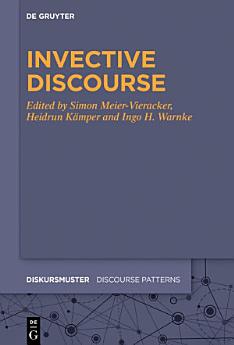Invective Discourse
Simon Meier-Vieracker · Heidrun Kämper · Ingo Warnke
ডিচে ২০২৩ · Diskursmuster / Discourse Patterns কিতাপ 34 · Walter de Gruyter GmbH & Co KG
ইবুক
238
পৃষ্ঠা
reportমূল্যাংকন আৰু পৰ্যালোচনা সত্যাপন কৰা হোৱা নাই অধিক জানক
এই ইবুকখনৰ বিষয়ে
Invective phenomena with the purpose or effect of marginalization and exclusion, of insult and debasement, of discrimination and verbal aggression have long been in the focus of discourse-analytical research. Among the various linguistic disciplines that deal with invective communication, discourse approaches have a particular analytical potential. They shift the focus to discursive conditions and the effects of power relations which make invective practices possible in the first place, and shed light on their contextual and epistemic embeddings.
The interdisciplinary volume is devoted to the forms, formats, and effects of invective communication in both contemporary and historical discourse constellation, from different cultural contexts and in diverse media constellations. The contributions from the fields of linguistics, literature, and sociology thus demonstrate the potentials of discourse-analytical approaches in the study of invectives and invectivity.
লিখকৰ বিষয়ে
Simon Meier-Vieracker, Institut für Germanistik, TU Dresden; Heidrun D. Kämper, Leibniz-Institut für deutsche Sprache, Mannheim; Ingo H. Warnke, Institut für Germanistik, Universität Bremen, Deutschland
এই ইবুকখনক মূল্যাংকন কৰক
আমাক আপোনাৰ মতামত জনাওক।
পঢ়াৰ নির্দেশাৱলী
স্মাৰ্টফ’ন আৰু টেবলেট
Android আৰু iPad/iPhoneৰ বাবে Google Play Books এপটো ইনষ্টল কৰক। ই স্বয়ংক্রিয়ভাৱে আপোনাৰ একাউণ্টৰ সৈতে ছিংক হয় আৰু আপুনি য'তে নাথাকক ত'তেই কোনো অডিঅ'বুক অনলাইন বা অফলাইনত শুনিবলৈ সুবিধা দিয়ে।
লেপটপ আৰু কম্পিউটাৰ
আপুনি কম্পিউটাৰৰ ৱেব ব্রাউজাৰ ব্যৱহাৰ কৰি Google Playত কিনা অডিঅ'বুকসমূহ শুনিব পাৰে।
ই-ৰীডাৰ আৰু অন্য ডিভাইচ
Kobo eReadersৰ দৰে ই-চিয়াঁহীৰ ডিভাইচসমূহত পঢ়িবলৈ, আপুনি এটা ফাইল ডাউনল’ড কৰি সেইটো আপোনাৰ ডিভাইচলৈ স্থানান্তৰণ কৰিব লাগিব। সমৰ্থিত ই-ৰিডাৰলৈ ফাইলটো কেনেকৈ স্থানান্তৰ কৰিব জানিবলৈ সহায় কেন্দ্ৰত থকা সবিশেষ নিৰ্দেশাৱলী চাওক।








